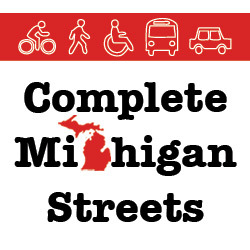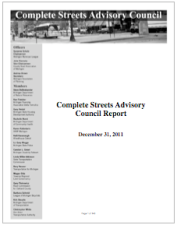You are currently browsing the tag archive for the ‘State Transportation Commission’ tag.
After the State Transportation Commission officially adopted a Complete Streets policy on July 26th, 2012, as required by PA 134 and PA 135 of 2010, the Michigan Department of Transportation wasted no time in getting the word out about the good news. Upon request from the Michigan Complete Streets Advisory Council, MDOT recently published this one-page leave behind regarding the new policy in an effort to help inform internal staff, as well as road commissions, municipalities, and other interest groups across the state.
The one-pager includes the following vision for Complete Streets in Michigan:
- A transportation network that is accessible, interconnected and multimodal and that safely and efficiently moves goods and people of all ages and abilities throughout the State of Michigan.
- A process that empowers partnerships to routinely plan, fund, design, construct, maintain and operate complete streets that respect context and community values.
- Outcomes that will improve economic prosperity, equity, accessibility, safety and environmental quality.
Download the one-pager or preview it below.
 Yesterday the State Transportation Commission (STC),a six-member board that establishes policy and plans for Michigan’s transportation department, formally adopted a Complete Streets policy. The policy will direct Michigan Department of Transportation planners to keep all users in mind – including bicyclists, transit riders, motorists and pedestrians of all ages and abilities.
Yesterday the State Transportation Commission (STC),a six-member board that establishes policy and plans for Michigan’s transportation department, formally adopted a Complete Streets policy. The policy will direct Michigan Department of Transportation planners to keep all users in mind – including bicyclists, transit riders, motorists and pedestrians of all ages and abilities.
The STC invited public comment on the draft Complete Streets policy released at its June 28 meeting in Sault Ste. Marie. Many citizens and bicycle and pedestrian advocates across the state took advantage of the public comment period to request that the policy include stronger, clearer and more specific language with firm timelines for implementation. This included a petition drive led by the League of Michigan Bicyclists (LMB), which collected nearly 2500 signatures in a single week.
We thank the STC for being so responsive to the requests made by concerned citizens. Added and/or modified language strengthened the final policy providing more clarity in a number of areas as outlined below. A big thanks also goes out to all of the Michigan Complete Streets advocates who took the time to comment on the draft policy - your voices were heard!
Public Act 135 of 2010 requires the STC to enact a Complete Streets policy by August 2012. The STC has worked closely with the governor-appointed 18-member Complete Streets Advisory Council on the draft policy. The group’s role, according to law, is to advise the STC, county road commissions and municipalities on Complete Streets policies. Council members represent road and transit agencies, state agencies, walking and biking organizations, and environmental, senior citizens and disabled persons groups.
Below is a analysis of the final policy comparing it to the major revisions requested by the LMB petition.
- Strengthen implementation language.
- Identify the procedures or guidelines that will be developed or revised. – Did not include.
- Include a timeframe by which implementing documents will be developed or revised. – Included, by December 31, 2013.
- State a commitment to continue programs to educate and train MDOT personnel and other stakeholders on complete streets implementation. – Included language about training/education.
- Include language about implementation accountability. – Included language with a bit more specificity on what MDOT will report annually to the STC, but nothing about who will be responsible for developing/revising procedures, etc.
- State a commitment to continuing to base facilities design and construction on existing laws, best practices, and guidance documents. – Included language about this.
- Strengthen exception language.
- Refer to the exceptions already outlined in PA 135. – Not specifically referenced.
- Include a timeframe by which an exception procedure document will be developed. – Included, by December 31, 2013
- Include language about developing and using performance measures. – Included language about what MDOT will report annually to the STC, which stated “any information/examples to gauge MDOT’s performance.” (Not exactly what we was requested.)
- Strengthen language to direct MDOT to work with local road agencies (change “may” to “shall”). – Language was strengthened; “MDOT shall work with local road agencies that are undertaking road or bridge projects with federal funds…”
- Amend language about the network approach to expand “non-motorized” users to include all users, including people with disabilities and transit users. – Language states “all users”
- Specify whether there will be a sunset on annual reports to the State Transportation Commission. – Not specified.
Read the final policy below or download a PDF here.
The Complete Streets Advisory Council met yesterday and announced the release of an annual report detailing progress made since Complete Streets legislation went into effect in Michigan on Aug. 1, 2010. The report is available online at: www.michigan.gov/completestreets or can be viewed in the PDF viewer below.
The Complete Streets law was enacted to encourage counties, cities, villages and townships to work cooperatively to incorporate policies that ensure that roads and streets take into account the mobility needs of all legal users, including bicyclists, pedestrians and those traveling by assistive devices such as wheelchairs. Public Acts 134 and 135 of 2010 also requires the State Transportation Commission to enact a Complete Streets policy for MDOT by August 2012.
The 18-member council worked together over the last year to develop a vision statement and sample policy language for the State Transportation Commission. The report released yesterday notes that 63 Michigan communities have enacted Complete Streets policies and/or resolutions as of November 2011, putting Michigan ahead of all other states.
Members of the Complete Streets Advisory Council represent road and transit agencies, state agencies, walking, biking and environmental organizations, senior citizen and disabled persons groups. The council’s role, according to law, is to provide education and advice to the State Transportation Commission, county road commissions and municipalities. More information is available online at: www.michigan.gov/completestreets.
















